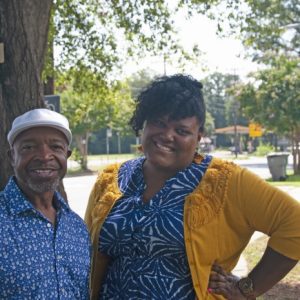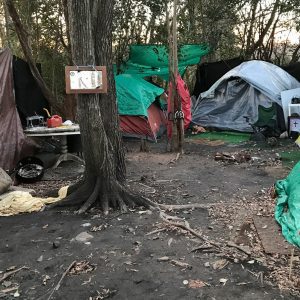Economic Mobility

From textiles to trails: A river’s changing path to prosperity
The South Fork of the Catawba is not the river Ted Reece remembers from his youth. Reece, 91, can still picture the South Fork backed up to form a massive pool serving the Mays and Mayflower mills’ dyeing and finishing operations. It was wide and flat enough to land a seaplane — a spectacle he […]

High rent, cost burdens, and inadequate supply: Five new, key facts about housing
Charlotte and Mecklenburg County are still facing a large gap between the supply of affordable housing and the number of residents who need it, as inreasing rents and a tight housing market are squeezing more families’ budgets and putting them at risk of housing instability, evicion and homelessness. Those are some of the key findings […]

Commuting and the Charlotte region’s economic connections
An array of environmental, cultural and economic connections together give rise to the interdependence of the Carolinas Urban-Rural Connection study region. But none of these connections are more economically significant than the flow of workers within our regional economy. Counties within the region relied on out-of-county commuters for their workforces more in 2015 than at […]

How can we reconnect North Carolinians to opportunities and good jobs?
To move up the ladder of opportunity, there’s generally consensus that people need jobs that pay a living wage, where they can grow their earnings over time. But what’s the best way to get workers, especially low-income workers with barriers such as low educational attainment, connected to those jobs? That’s the focus of the ReCONNECT […]

The Urban Institute Research Faculty Fellows seek to better our region
A new program designed to identify solutions for some of the pressing needs and issues facing the greater Charlotte region is getting underway this fall at the UNC Charlotte Urban Institute. For the first time, the Institute has named a cohort of Faculty Fellows to conduct research projects and work alongside local stakeholders to understand […]

Can a community land trust stop gentrification in west Charlotte? This group thinks so.
With a full-time executive director and a $200,000 grant, a three-year-old west Charlotte nonprofit is accelerating its efforts to stave off displacement with a housing strategy that’s unprecedented in this fast-developing city. In the next five years, the West Side Community Land Trust wants to build 50 permanently affordable housing units in historically black neighborhoods […]

Five maps that show stark health disparities in Mecklenburg County
Sharp differences in race and income are visible on a map of Mecklenburg County, generally in the familiar “crescent and wedge” pattern many Charlotteans are familiar with. For example, check out the divisions on this map of household income: But differences are also available in other, more unexpected dimensions as well. These five maps illustrate […]

Project documenting evictions’ toll in Mecklenburg wins national award
Tens of thousands of people a year are evicted in Mecklenburg County, but the full impact is hard to see. Court data on evictions is often incomplete or accessible only in paper files, difficult to compile and access. Demographic data on who is evicted, and for what reasons, is not comprehensively collected. There’s little tracking […]

Five maps that show inequality in Charlotte in surprising ways
Charlotte is familiar with the so-called “crescent” and “wedge,” the longstanding pattern of race, income and wealth distribution that shapes much of the city. Wealthier, and often more white, residents are concentrated in the wedge-shaped slice of south Charlotte, while an arc of lower-income communities stretches to the north, east and west. It’s an oft-referenced […]

People assume transit causes displacement. Does it really?
It’s a familiar story: A new transit line opens, spurring gentrification in nearby neighborhoods and pushing out long-time residents. But is that always what happens? New research from Dr. Elizabeth Delmelle, Dr. Isabelle Nilsson, Dr. Claire Schuch, and Tonderai Mushipe – all from UNC Charlotte’s Department of Geography and Earth Sciences – shows that the […]